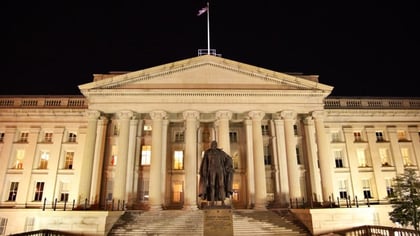Kenneth Blanco, director of the Treasury Department’s Financial Crimes Enforcement Network (FinCEN), embraced gathering more data to combat fraud, but rejected senators’ request to consider raising the reporting threshold for filing suspicious activity reports, or SARs, during a recent hearing.
Additional requirements and rules that Congress has been mulling would be yet “another layer of bureaucracy” in the anti-money laundering framework, Blanco told members of the Senate Banking Committee during a Thursday hearing on potential reforms to and streamlining of agency coordination regarding the Bank Secrecy Act.
The sometimes heated Senate hearing was the fourth hearing this year on potential BSA reforms. As part of the effort, Senate Banking Committee members are looking at possibly changing the thresholds and requirements for SARs as well as currency transaction report (CTR) requirements, including reporting thresholds.
Blanco told lawmakers that Treasury already has a “very strong, thriving” interaction with stakeholders and adding more legislative requirements would move resources away from his current workload of investigating terrorists, money launderers, human traffickers and human rights violators.
Blanco and Steven D’Antuono, section chief, financial crimes section for the Federal Bureau of Investigation, both told lawmakers that the more information they can glean, the better for fighting crime.
“Beneficial ownership information is critical to national security and investigations,” D’Antuono told lawmakers. “I can almost assure you that if we had a beneficial ownership system, I can almost say it would have been found earlier and the investigation would have been quicker,” the FBI official said, referring to an investigatory matter under discussion.
On Justice Department letterhead, he said in written testimony that “increasingly, sophisticated criminals seek access to the U.S. financial system by masking the nature, purpose or ownership of their accounts and the sources of their income through the use of front companies, shell companies or nominee accounts with unknown beneficial owners.”
Blanco cast a wary eye on the notion of raising the suspicious-activity reporting threshold of $10,000, citing concerns internally as well as from law enforcement partners.
Based on a reviewed of CTR filings, FinCEN found that increasing the SARs threshold to $20,000 would cause FinCEN to lose over 60% of CTR-based financial intelligence on which FinCEN and law enforcement, in particular, currently rely.
Increasing the threshold to $30,000 could result in a loss of close to 80% of currently provided data, the very kind needed to find illegal networks and investigate them properly, according to Blanco.









 December 04, 2018 at 02:16 PM
December 04, 2018 at 02:16 PM











